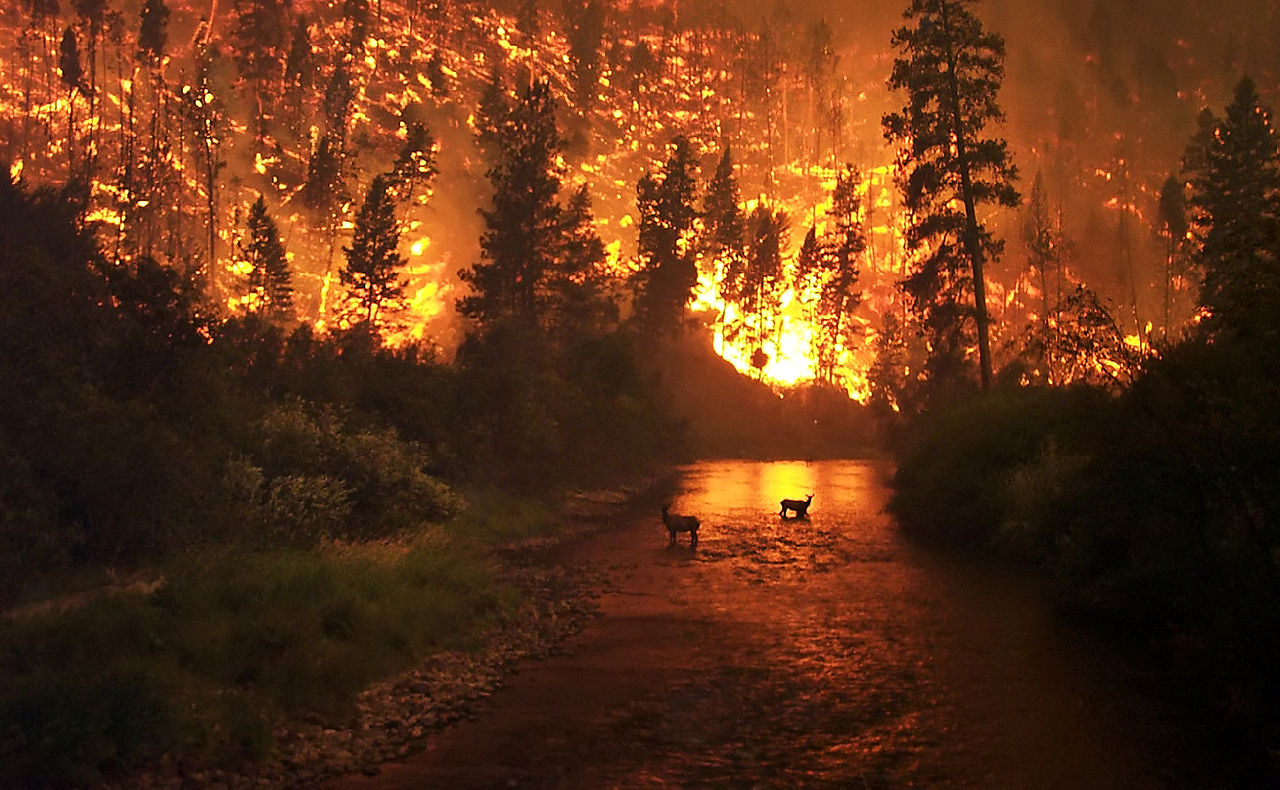Racism and climate change denial: Study delves into the link
Digital Writer/Climate Change Reporter
Wednesday, June 13, 2018, 1:48 PM - A look at the relationship between racism and climate change denialism, the skyrocketing value of the green economy that is surpassing fossil fuels, a look at how gasoline can be made from thin air, and the three triggers that set off wildfires. It’s What’s Up in Climate Change.
Investigating the correlation between racism and climate change denial
Research shows that since Barack Obama’s presidency in 2008, racial identification and attitudes have increasingly spilled over into polarizing issues with divided public opinion, such as health care, and new research by Dr. Salil Benegal from DePauw University provides evidence of a 'racial spillover effect' into the climate change discourse in the United States.
So, are people with racist views more likely to be climate change deniers?
The research was conducted using data from Pew and American National Election Surveys and the key findings are:
• Racial identification and concern about climate change strengthened while Obama was president
• Aggregate opinion trends indicate that the steepest decline in public concern about climate change occurred among white Americans after 2008
• Increasing levels of racial resentment are strongly associated decreased belief in climate change
• White Republicans with high levels of racial resentments have an 84 per cent probability of disagreeing with the statement: ‘Do you agree that climate change is largely climate change is largely due to human activity?’
So how can unrelated views, like opinions about race and the environment influence each other?
This study explains that some voters viewed Obama through a 'racial lens' and began to associate his policies with race - white voters with racial resentment were less supportive of his unique initiatives like the Affordable Care Act, whereas other voters that identified with Obama’s personal characteristics were more supportive of his proposed policies, and more inclined to support his future policies.

Credit: Wikimedia Commons
The process of ‘racialization’ happens when racial identities or prejudices become increasingly related to specific policies or actions, such as police brutality, or when people assume stereotypes or have racial perceptions of people that are the recipients of certain policies, like unemployment benefits.
Increased partisan sorting along racial attitudes is a phenomenon that has influenced political identity for decades - the ‘Southern Strategy’ refers to a Republican electoral strategy that involves politicians consciously appealing to racial grievances of white Southerners to gain their support - some theorize that Richard Nixon’s sympathy to white voters that felt threatened and unhappy with the Civil Rights Movement contributed to his successful campaigns in 1968 and 1972 where he promised to fight crime with more police surveillance and address the role of government.
Despite extensive factual evidence, peer-reviewed literature, and scientific expertise, climate change is a topic that is contended, and public opinion remains divided. Previous research on climate change denialism suggests that being poorly informed on the scientific consensus of climate change could cause people to trust opinions from powerful elites, people’s own experiences with weather, and the relationship between economic recession and decreased concern about climate change.
Donald Trump is president of the second-highest polluting nation in the world, has pulled out of the Paris Agreement, and has referred to climate change as a hoax created by China. While racial attitudes and resentments do not entirely explain the trend with climate change denialism, these findings can help us understand previous and current variations in climate change beliefs.
Green economy's value will soon overtake fossil fuel sector
Renewable energies have made big strides in recent years and the green economy, worth $4 trillion USD, is now approximately the same size as the shrinking fossil fuel sector.
A new report from FTSE Russell states that the green economy has rapidly grown and now represents 6 per cent of globally listed equity.

Some of the fastest growing renewable energy resources include wind, solar, and biomass. Credit: Wikimedia Commons
Energy trends in 2017 reflect the declining investment in fossil fuels as renewables were the most favoured energy type that was added to the world’s energy capacity and constituted 70 per cent of the net addition. Despite the successes of the green economy, global populations and economies are expanding and in 2017 the world’s energy demand increased by 2.1 per cent and energy-related carbon dioxide emissions increased by 1.4 per cent, which has been the first increase in four years for both of these trends.
While the rapid growth of the green economy is promising, challenges with meeting increasing global energy demands and competing with energy-dense fossil fuels prove to be limitations of renewable energies. The uses of renewable energies have slowed the transition away from fossil fuels in sectors like transportation, where 92% of the energy demand continues to be met by oil.
Can gasoline be made out of air instead of fossil fuels?
A sustainable future where we still rely on gasoline? New research suggests it could happen, but there’s a catch.

Technological advancements may be the solution to the demand for gasoline. Credit: Wikimedia Commons
Cars, the Internet, clothing, food - every aspect of our lives are facilitated by fossil fuels. While climate change discussions revolve around the urgent need for humans to reduce our dependence on polluting sources of energy, a new study looks at how hydrocarbons, the main component in fossil fuels, can be created by taking air and processing it to extract pure carbon dioxide and convert it into a fuel that is similar to the conventional fossil fuels we are used to.
By using the carbon dioxide that is already in the atmosphere to create fuels like gasoline, the requirement to extract new fossil fuels from the ground will disappear. A continuous cycle of capturing carbon dioxide then releasing it back into the atmosphere would result in a consistent amount of carbon in the atmosphere, as opposed to a growing rate of carbon emissions by extracting and burning new fossil fuels.
Even better, this technology also owns the ability to capture carbon from the air and convert it into a form that permanently stays out of the air. This carbon capture technology with the benefit of producing sustainable hydrocarbons is an innovative solution that could allow us to live more environmentally without compromising our way of life.
Isn’t this the perfect solution to our problem? The catch is that this technology can only capture 1 megaton (Mt) of carbon per year, which in the grand scheme of things is very small. For Canada to reach its 2030 carbon reduction goals, emissions must be 200 Mt less than what was emitted in 2005, and 2016 projections show that even with the best-case scenario involving extension environmental policies and clean energies, Canada’s emissions will only be 50 Mt less than 2005 levels and could miss the mark by a whopping 150 Mt.
While sustainable solutions for hydrocarbons are enticing, ideally carbon capture can be prioritized first in order to meet carbon goals and effectively make change.
The three triggers for a scorching wildfire season
The Fort McMurray wildfire in 2016 was the costliest disaster in Canadian history with damage estimated to be $9.9 billion CND and California’s wildfires in 2017 were the deadliest and most destructive series of wildfires in California’s history. The unsettling wildfire trends in recent history have many wondering what’s in store for 2018.

A wildfire in the Bitterroot National Forest in Montana, United States from 2000. Credit: Wikimedia Commons
Researchers from the University of Colorado Boulder wanted to know why wildfires are burning for longer and becoming more destructive and recently published a study on the particularly devastating 2017 wildfire season in the western United States, despite wet winter and early spring conditions.
The research found that there are three “switches” that are flipped on or off to set the conditions for blazing wildfires:
• Ignition - This is how the fires are started and during 2018 in the United States 89 per cent of wildfires were started by people, such as carelessness with campfires or discarding lit cigarettes. Natural sources of ignition include lightning strikes or heat from the Sun.
• Fuel - The amount of flammable material surrounding a fire is referred to as the fuel or fuel load, and 2017’s wet winter and spring conditions promoted the growth of 'fine fuels' such as shrubs or grasses, which burned during the wildfires.
• Aridity - Despite the wet winter and spring, some regions of the western U.S. experienced the warmest months from May to September and driest months from September to December, which caused fuels to become dry and more flammable.
The findings report that all of these switches were on and some switched on much faster than usual and stayed on for longer than expected. In addition to the natural variability of wildfire seasons, researchers also note that strong easterly winds and climate change contributed to the severity of the wildfire.
What are the conditions for this year’s wildfire season? For the U.S. the National Oceanic and Atmospheric Administration reports that most of the west will be abnormally hot and the Pacific Northwest will be abnormally dry during the core wildfire season from June to August. For Western Canada, the Prairies are expected to be dry with worsening drought conditions and warmer than normal temperatures are expected in British Columbia.
Sources: Environmental Politics | Joule | Reuters | FTSE Russell | Fire | NOAA



